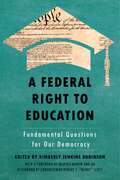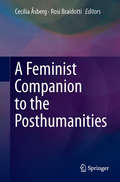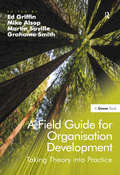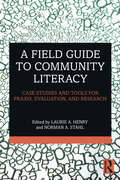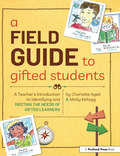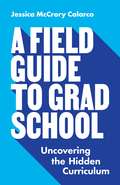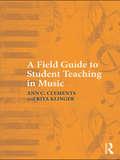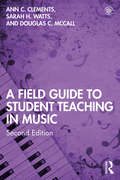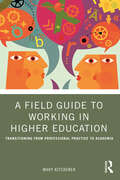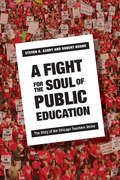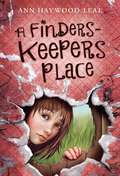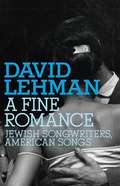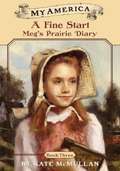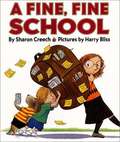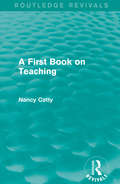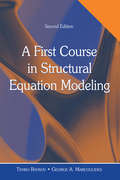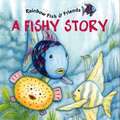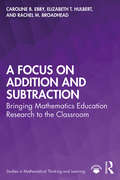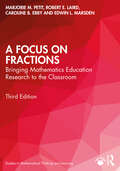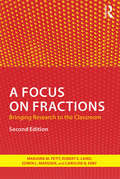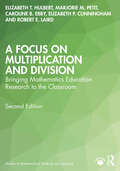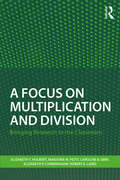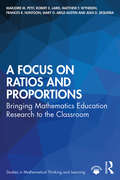- Table View
- List View
A Federal Right to Education: Fundamental Questions for Our Democracy
by Kimberly Jenkins RobinsonHow the United States can provide equal educational opportunity to every child The United States Supreme Court closed the courthouse door to federal litigation to narrow educational funding and opportunity gaps in schools when it ruled in San Antonio Independent School District v. Rodriguez in 1973 that the Constitution does not guarantee a right to education. Rodriguez pushed reformers back to the state courts where they have had some success in securing reforms to school funding systems through education and equal protection clauses in state constitutions, but far less success in changing the basic structure of school funding in ways that would ensure access to equitable and adequate funding for schools. Given the limitations of state school funding litigation, education reformers continue to seek new avenues to remedy inequitable disparities in educational opportunity and achievement, including recently returning to federal court. This book is the first comprehensive examination of three issues regarding a federal right to education: why federal intervention is needed to close educational opportunity and achievement gaps; the constitutional and statutory legal avenues that could be employed to guarantee a federal right to education; and, the scope of what a federal right to education should guarantee. A Federal Right to Education provides a timely and thoughtful analysis of how the United States could fulfill its unmet promise to provide equal educational opportunity and the American Dream to every child, regardless of race, class, language proficiency, or neighborhood.
A Feminist Companion to the Posthumanities
by Rosi Braidotti Cecilia ÅsbergThis companion is a cutting-edge primer to critical forms of the posthumanities and the feminist posthumanities, aimed at students and researchers who want to catch up with the recent theoretical developments in various fields in the humanities, such as new media studies, gender studies, cultural studies, science and technology studies, human animal studies, postcolonial critique, philosophy and environmental humanities. It contains a collection of nineteen new and original short chapters introducing influential concepts, ideas and approaches that have shaped and developed new materialism, inhuman theory, critical posthumanism, feminist materialism, and posthuman philosophy. A resource for students and teachers, this comprehensive volume brings together established international scholars and emerging theorists, for timely and astute definitions of a moving target – posthuman humanities and feminist posthumanities.
A Fiber Artist's Guide to Color and Design
by Heather ThomasA comprehensive guide to everything colorful, A Fiber Artist's Guide to Color & Design is a must-have for artists, quilters, students, and anyone fascinated by the languages of color and design. With over 200 pages filled with detailed explanations, photos, examples, illustrations, and lessons, learn directly from an experienced artist and art teacher, Heather Thomas. Beginning with a study of the color wheel and color theory, the book then takes a detailed look at each individual color. From there, you'll understand how colors work together before learning the elements and principles of design, from line, shape, and form to contrast, balance, and unity. Finally, apply all the readings to actually creating! Progressing in difficulty and building upon the previous lesson, you'll round off with 12 workshops for hands-on learning and experimentation. Each lesson is presented in such a way to help you reach the project's goal and ultimately become a better artist!
A Field Guide for Organisation Development: Taking Theory into Practice
by Martin Saville Grahame Smith Ed Griffin Mike AlsopOrganisation Development, as a field, is messy, imperfect and hard to get hold of - it is like nailing jelly to the wall. A Field Guide for Organisation Development offers a variety of perspectives and unparalleled experiences from practitioners and researchers who all share an interest and involvement in Organisation Development (OD). In it are multiple voices, mindsets and practices - not all of which necessarily agree with each other. Leading OD practitioners present a contemporary, practical guide that tackles the dilemmas and polarities that face anyone studying or practising within the OD arena, and encourages them to develop their own particular practice of OD in a way that is appropriate for their context, skills and preferences, while challenging them to look beyond what comes naturally. Here are new ways to support the growth and development of an organisation from modest endeavours that are small in scale to organisation-wide change programmes. A Field Guide for Organisation Development is as comprehensive a resource to support the practice of OD as can be found anywhere. It covers issues of organisational health as well as offering tools aimed at supporting practitioners to survive in the harsh realities of organisational life. It contains chapters on the OD practitioner, on groups, on culture, on data and evaluation. It offers perspectives on change, on the relationship between OD and HR, and on the use of external consultants.
A Field Guide to Community Literacy: Case Studies and Tools for Praxis, Evaluation, and Research
by Laurie A. Henry Norman A. StahlThis practical guidebook presents trends, research-grounded strategies, and field-based solutions to challenges of working in community-based literacy initiatives. A comprehensive guide for practitioners, this book addresses best practices for implementing, maintaining, expanding, and evaluating community-based literacy initiatives. The contributors in this volume help readers shift thinking from merely considering, "How can communities support literacy?" to "How can literacy help us create, support, and strengthen communities?" Organized into four parts – on building community through literacy, program design, case studies from the field, and program evaluation – chapters cover research-based and innovative practices in a diverse range of populations and settings, including family services, adult literacy initiatives, community centers, and tutoring programs. With an abundance of praxis-oriented examples and real-world strategies from top scholars and practitioners, the book serves as a roadmap for essential topics, including funding, writing grant proposals, handling audits, and conducting research within program settings. With templates, models, planning tools, and checklists ready for immediate use, this book is an invaluable field manual for individuals involved in community literacy work, researchers, and students in literacy-oriented courses either at the undergraduate or graduate levels.
A Field Guide to Gifted Students: A Teacher's Introduction to Identifying and Meeting the Needs of Gifted Learners (Other Ser.)
by Charlotte Agell Molly KelloggA Field Guide to Gifted Students is a practical manual to the unique characteristics of gifted and advanced learners. Presented as a concise 32-page, full-color booklet available in sets of 10 print copies or a single eBook copy, this resource: Can be used in teacher workshops and other group professional learning settings. Assists educators in understanding and meeting the academic and social-emotional needs of gifted students. Includes a companion online facilitator's guide. Features practical tips based on current research and best practices. Is packed with illustrations, checklists, space to write notes, and a glossary of terms. School can feel like the wrong fit for many gifted learners, but through learning how to notice and support gifted students' diverse traits and needs, educators can build ideal classroom climates for student success. Readers will understand how to identify giftedness and related traits, including twice-exceptionality, introversion and extroversion, perfectionism, sensitivity, and intuitiveness. The online facilitator's guide includes everything workshop leaders need to conduct a brief course for classroom teachers, coordinators, counselors, or even parents.
A Field Guide to Grad School: Uncovering the Hidden Curriculum (Skills for Scholars)
by Jessica McCrory CalarcoAn essential handbook to the unwritten and often unspoken knowledge and skills you need to succeed in grad schoolSome of the most important things you need to know in order to succeed in graduate school—like how to choose a good advisor, how to get funding for your work, and whether to celebrate or cry when a journal tells you to revise and resubmit an article—won’t be covered in any class. They are part of a hidden curriculum that you are just expected to know or somehow learn on your own—or else. In this comprehensive survival guide for grad school, Jessica McCrory Calarco walks you through the secret knowledge and skills that are essential for navigating every critical stage of the postgraduate experience, from deciding whether to go to grad school in the first place to finishing your degree and landing a job. An invaluable resource for every prospective and current grad student in any discipline, A Field Guide to Grad School will save you grief—and help you thrive—in school and beyond.Provides invaluable advice about how to:Choose and apply to a graduate programStay on track in your programPublish and promote your workGet the most out of conferencesNavigate the job marketBalance teaching, research, service, and life
A Field Guide to Student Teaching in Music
by Rita Klinger Ann C. ClementsA Field Guide to Student Teaching in Music is a practical guide focused on the link between music education coursework and the field-based aspects of the student teaching experience. It addresses general topics that are common to all music placements, as well as those topics that are of specific interest to the general, choral, and instrumental music classrooms. This text builds on theoretical materials typically covered in music methods courses, yet it is not specific to any one particular teaching pedagogy, making it flexible enough for use in a variety of music teaching settings. It will guide students through the student teaching process as they make the transition from student to music educator.
A Field Guide to Student Teaching in Music
by Ann C. Clements Sarah H. Watts Douglas C. McCallA Field Guide to Student Teaching in Music, Second Edition, serves as a practical guide for the music education student, one that recognizes the importance of effective coursework while addressing the unique field-based aspects of the music classroom. Student teaching in music is a singular experience, presenting challenges beyond those encountered in general education classroom settings: educators must plan for singing and movement, performances and rehearsals, intensive parent involvement, uniforms, community outreach, and much more. This guide explores such topics common to all music placements as well as those specific to general, choral, and instrumental music classrooms, building on theoretical materials often covered in music methods courses and yet not beholden to any one pedagogy, thus allowing for a dynamic and flexible approach for various classroom settings. New to the second edition: Companion website featuring downloadable worksheets, résumé support, a cooperating teacher guide, and more: www.musicstudentteaching.com A new chapter on the transition from student to student teacher Expanded discussions on the interview process, including mock interviews, interviewing techniques, and online interview prep Updated content throughout to reflect current practices in the field. Leading readers through the transition from student to teacher, A Field Guide to Student Teaching in Music, Second Edition, represents a necessary update to the first edition text published a decade ago, an indispensable resource that provides the insights and skillsets students need to launch successful careers as music educators.
A Field Guide to Working in Higher Education: Transitioning from Professional Practice to Academia
by Mary KitchenerHigher education has had a long and growing association with professional practice. Yet the need to unpack and demystify the day-to-day workings has never been greater, especially for new pracademics – academics entering from professional practice. Mapped to the Advance HE Professional Standards Framework (PSF 2023) and the Institute for Apprenticeships and Technical Education (IfATE), this invaluable guide will help you navigate your new academic career, covering all key aspects to support a successful transition. Key features include the following: Hints, tips, narratives, and examples from experienced pracademics from a diverse and broad range of professions and higher education institutions Support and guidance on the academic role, teaching, learning and assessment, supporting students, researching and supervision, academic well-being, and continuing professional development. A ‘go-to’ Learning Activity Compilation. Practical strategies and guidance to swiftly adapt to your academic practices A detailed glossary to quickly locate key terms Packed full of practical guidance, this go-to guide will act as the perfect companion to help you navigate through your new pracademic career. It is essential reading for anyone taking part in an accredited academic initial professional development programme, as well as those more experienced academics who want to refresh their knowledge and understanding.
A Fight for the Soul of Public Education: The Story of the Chicago Teachers Strike
by Robert Bruno Steven AshbyIn reaction to the changes imposed on public schools across the country in the name of "education reform," the Chicago Teachers Union redefined its traditional role and waged a multidimensional fight that produced a community-wide school strike and transformed the scope of collective bargaining into arenas that few labor relations experts thought possible. Using interviews, first-person accounts, participant observation, union documents, and media reports, Steven K. Ashby and Robert Bruno tell the story of the 2012 strike that shut down the Chicago school system for seven days. A Fight for the Soul of Public Education takes into account two overlapping, parallel, and equally important stories. One is a grassroots story of worker activism told from the perspective of rank-and-file union members and their community supporters. Ashby and Bruno provide a detailed account of how the strike became an international cause when other teachers unions had largely surrendered to corporate-driven education reform. The second story describes the role of state and national politics in imposing educational governance changes on public schools and draconian limitations on union bargaining rights. It includes a detailed account of the actual bargaining process revealing the mundane and the transcendental strategies of both school board and union representatives.
A Finders-keepers Place
by Ann Haywood LealAs their mother's manic-depression grows worse, eleven-year-old Esther and her sister Ruth visit various churches hoping to find their father, a preacher named Ezekiel who left them seven years before in 1966.
A Fine Coat (Book 6)
by Barbara W. MakarDecodable Storybooks 2A accompany More Workbook 2 and provide additional opportunity to apply the phonetic concepts introduced in Workbook 2 to connected text. The storybooks use the same vocabulary as Workbook 2 and Storybooks 2 with the addition of one sight word was. Storybooks 2A are an excellent tool to reinforce the skills from Workbook 2 and can be used with either Workbook 2 or More Workbook 2"--Epsbooks.com.
A Fine Romance: Jewish Songwriters, American Songs
by David LehmanWith a poet's eye for language and nuance, Lehman takes a personal journey into the past of American music, showing how the songs that we view as quintessentially American were almost all written by Jews, many of them immigrants. Recounting the stories behind numerous songs and shows, the author explains how Jewish songsmiths combined their native plaintiveness and wit with Black blues to create a distinctively American musical form. With analytical skill, wit, and exuberance, Lehman helps readers understand how natural it is that Wizard of Oz composer Harold Arlen was the son of a cantor who incorporated "Over the Rainbow" into his Sabbath liturgy Annotation c2010 Book News, Inc. , Portland, OR (booknews. com)
A Fine Start: Meg's Prairie Diary, Book 3 (My America)
by Kate McmullanNine-year-old Meg has finally been reunited with her family in Kansas Territory and life finally seems to be settling down after the pro-slavery ruffians finally were forced to leave. Her third diary is another triumph.
A Fine, Fine School
by Sharon CreechOne day, Mr. Keene called all the students and teachers together and said, "This is a fine, fine school! From now on, let's have school on Saturdays too." And then there was more. School all weekend. School on the holidays. School in the SUMMER! What was next ... SCHOOL AT NIGHT? So it's up to Tillie to show her well-intentioned principal, Mr. Keene, that even though his fine, fine school is a wonderful place, it's not fine, fine to be there all the time.
A First Book on Teaching (Routledge Revivals)
by Nancy CattyFirst published in 1929, this book is a beginner's guide to the practice of teaching. The preparation and giving of lessons, the function of class teaching, sectionizing and individual work, the art of happy relations between class and teacher, the foundations of school tone, and the tests of a good curriculum are discussed and illustrated from school and training college experience. Use is made of the reader's memories of school-days, and the exercises, an integral part of the book, provide a critical reading. A study of the text as a basis for discussion makes an excellent preparation for teaching.
A First Course in Structural Equation Modeling
by George A. Marcoulides Tenko RaykovIn this book, authors Tenko Raykov and George A. Marcoulides introduce students to the basics of structural equation modeling (SEM) through a conceptual, nonmathematical approach. For ease of understanding, the few mathematical formulas presented are used in a conceptual or illustrative nature, rather than a computational one. Featuring examples from EQS, LISREL, and Mplus, A First Course in Structural Equation Modeling is an excellent beginner’s guide to learning how to set up input files to fit the most commonly used types of structural equation models with these programs. The basic ideas and methods for conducting SEM are independent of any particular software. Highlights of the Second Edition include: • Review of latent change (growth) analysis models at an introductory level • Coverage of the popular Mplus program • Updated examples of LISREL and EQS • A CD that contains all of the text’s LISREL, EQS, and Mplus examples. A First Course in Structural Equation Modeling is intended as an introductory book for students and researchers in psychology, education, business, medicine, and other applied social, behavioral, and health sciences with limited or no previous exposure to SEM. A prerequisite of basic statistics through regression analysis is recommended. The book frequently draws parallels between SEM and regression, making this prior knowledge helpful.
A Fishy Story
by Marcus Pfister David AustinPuffer loves nothing better than entertaining the class with a good story. But when Angel, the new fish in class, arrives, it becomes clear that some of Puffer's claims just aren't true. How can Puffer win back his friends' trust? Picture descriptions present.
A Focus on Addition and Subtraction: Bringing Mathematics Education Research to the Classroom (Studies in Mathematical Thinking and Learning Series)
by Elizabeth T. Hulbert Caroline B. Ebby Rachel M. BroadheadThis innovative text offers a unique approach to making mathematics education research on addition, subtraction, and number concepts readily accessible and understandable to pre-service and in-service teachers of grades K–3. Revealing students’ thought processes with extensive annotated samples of student work and vignettes characteristic of teachers’ experiences, this book provides educators with the knowledge and tools needed to modify their lessons and improve student learning of additive reasoning in the primary grades. Based on research gathered in the Ongoing Assessment Project (OGAP), this engaging, easy-to-use resource features practical resources such as: A close focus on student work, including 150+ annotated pieces of student work, to help teachers improve their ability to recognize, assess, and monitor their students’ errors and misconceptions, as well as their developing conceptual understanding; A focus on the OGAP Addition, Subtraction, and Base Ten Number Progressions, based on research conducted with hundreds of teachers and thousands of pieces of student work; In-chapter sections on how Common Core State Standards for Math (CCSSM) are supported by math education research; End-of-chapter questions to allow teachers to analyze student thinking and consider instructional strategies for their own students; Instructional links to help teachers relate concepts from each chapter to their own instructional materials and programs; An accompanying eResource, available online, offers an answer key to Looking Back questions, as well as a copy of the OGAP Additive Framework and the OGAP Number Line Continuum. A Focus on Addition and Subtraction marks the fourth installment of the popular A Focus on… collection, designed to aid the professional development of pre-service and in-service mathematics teachers. Following from previous volumes on ratios and proportions, multiplication and division, and fractions, this newest addition is designed to bridge the gap between what math education researchers know and what teachers need to know in order to better understand evidence in student work and make effective instructional decisions.
A Focus on Fractions: Bringing Mathematics Education Research to the Classroom (Studies in Mathematical Thinking and Learning Series)
by Marjorie M. Petit Caroline B. Ebby Robert E. Laird Edwin L. MarsdenThe third edition of this book offers a unique approach to making mathematics education research on the teaching and learning of fraction concepts readily accessible and understandable to pre-service and in-service K-8 mathematics teachers. Revealing students’ thought processes with extensive annotated samples of student work and vignettes characteristic of classroom teachers’ experience, this book provides teachers a research-based lens to interpret evidence of student thinking, inform instruction and ultimately improve student learning. Based on research gathered in the Ongoing Assessment Project (OGAP), and updated throughout, this engaging and easy-to-use resource also features: Two new chapters dedicated to understanding the OGAP Fraction Framework and Progression—based on research conducted with hundreds of teachers—to gather and interpret evidence of student learning along a learning progression, referenced throughout the book so readers can apply the concepts to their instruction; A close focus on student work, including 180+ annotated pieces of student work, to help teachers improve their ability to recognize, assess, and monitor their students’ errors and misconceptions, as well as their developing conceptual understanding; A discussion of decimal fractions, also new to the third edition; In-chapter sections on how Common Core State Standards for Math (CCSSM) are supported by math education research; End-of-chapter Looking Back questions to allow teachers to analyze student thinking and consider instructional strategies for their own students; Instructional links to help teachers relate concepts from each chapter to their own instructional materials and programs; Accompanying online Support Material includes an answer key to Looking Back questions, as well as a copy of the OGAP Fraction Framework and Progression. A Focus on Fractions is part of the popular A Focus on . . . collection, designed to aid the professional development of pre-service and in-service mathematics teachers. As with the other volumes on addition and subtraction, ratios and proportions, and multiplication and division, this updated new edition bridges the gap between what math education researchers know and what teachers need to know in order to better understand evidence in student work and make effective instructional decisions.
A Focus on Fractions: Bringing Research to the Classroom (Studies in Mathematical Thinking and Learning Series)
by Marjorie M. Petit Caroline B. Ebby Robert E. Laird Edwin L. MarsdenA Focus on Fractions is a groundbreaking effort to make the mathematics education research on how students develop their understanding of fraction concepts readily accessible and understandable to pre- and in-service K– 8 mathematics educators. Using extensive annotated samples of student work, as well as vignettes characteristic of classroom teachers’ experiences, this book equips educators with the knowledge and tools to reveal students’ thinking so that they can modify their teaching and improve student learning of fraction concepts. A Focus on Fractions 2nd edition includes sections on the Common Core State Standards for Mathematics and the Ongoing Assessment Project (OGAP) Fraction Framework integrated into each chapter as well as a new chapter on the OGAP Fraction Progression and how it can be used for formative assessment purposes. This updated edition assists teachers in translating research findings into their classroom practice by conveying detailed information about how students develop fraction understandings. Additional images and examples serve to flesh out and supplement the newly-introduced concepts in this updated and expanded edition. Special Features: Looking Back Questions at the end of each chapter provide teachers the opportunity to analyze student thinking and consider instructional strategies for their own students. Instructional Links help teachers relate concepts from the chapter to their own instructional materials and programs. Big Ideas frame the chapters and provide a platform for meaningful exploration of the teaching of fractions. Answer Key posted online offers extensive explanations of in-chapter questions. New sections devoted to the CCSSM and OGAP Fraction Progression are woven throughout the book as well as a new stand alone chapter on the OGAP Fraction Progression. The OGAP Fraction Framework is an all-new eResource, now available as a free download from the book’s website: www.routledge.com/9781138816442.
A Focus on Multiplication and Division: Bringing Mathematics Education Research to the Classroom (Studies in Mathematical Thinking and Learning Series)
by Elizabeth T. Hulbert Marjorie M. Petit Caroline B. Ebby Elizabeth P. Cunningham Robert E. LairdThe second edition of this book offers a unique approach to making mathematics education research on the teaching and learning of multiplication and division concepts readily accessible and understandable to preservice and in-service K-6 mathematics teachers. Revealing students’ thought processes with extensive annotated samples of student work and vignettes characteristic of classroom teachers’ experience, this book provides teachers a research-based lens to interpret evidence of student thinking, inform instruction, and ultimately improve student learning. Based on research gathered in the Ongoing Assessment Project (OGAP) and updated throughout, this engaging and easy-to-use resource also features the following: New chapters on the OGAP Multiplicative Reasoning Framework and Learning Progressions and Using the OGAP Multiplicative Progression to inform instruction and support student learning In-chapter sections on how Common Core State Standards for Math are supported by math education research Case Studies focusing on a core mathematical idea and different types of instructional responses to illustrate how teachers can elicit evidence of student thinking and use that information to inform instruction Big Ideas frame the chapters and provide a platform for meaningful exploration of the teaching of multiplication and division Looking Back Questions at the end of each chapter allow teachers to analyze student thinking and to consider instructional strategies for their own students Instructional Links to help teachers relate concepts from each chapter to their own instructional materials and programs Accompanying online Support Material that includes an answer key to Looking Back questions, as well as a copy of the OGAP Fraction Framework and Progression A Focus on Multiplication and Division is part of the popular A Focus on . . . collection, designed to aid the professional development of preservice and in-service mathematics teachers. As with the other volumes on addition and subtraction, ratios and proportions, and fractions, this updated new edition bridges the gap between what math education researchers know and what teachers need to know to better understand evidence in student work and make effective instructional decisions.
A Focus on Multiplication and Division: Bringing Research to the Classroom (Studies in Mathematical Thinking and Learning Series)
by Elizabeth T. Hulbert Marjorie M. Petit Caroline B. Ebby Elizabeth P. Cunningham Robert E. LairdA Focus on Multiplication and Division is a groundbreaking effort to make mathematics education research readily accessible and understandable to pre- and in-service K–6 mathematics educators. Revealing students’ thought processes with extensive annotated samples of student work and vignettes characteristic of teachers’ experiences, this book is sure to equip educators with the knowledge and tools needed to modify their lessons and to improve student learning of multiplication and division. Special Features: Looking Back Questions at the end of each chapter allow teachers to analyze student thinking and to consider instructional strategies for their own students. Instructional Links help teachers relate concepts from each chapter to their own instructional materials and programs. Big Ideas frame the chapters and provide a platform for meaningful exploration of the teaching of multiplication and division. Answer Key posted online offers extensive explanations of in-chapter questions. Each chapter includes sections on the Common Core State Standards for Mathematics and integrates the Ongoing Assessment Project (OGAP) Multiplicative Reasoning Progression for formative assessment purposes. Centered on the question of how students develop their understanding of mathematical concepts, this innovative book places math teachers in the mode of ongoing action researchers.
A Focus on Ratios and Proportions: Bringing Mathematics Education Research to the Classroom (Studies in Mathematical Thinking and Learning Series)
by Marjorie M. Petit Robert E. Laird Matthew F. Wyneken Frances R. Huntoon Mary D. Abele-Austin Jean D. SequeiraThis resource offers a groundbreaking effort to make mathematics education research on ratios and proportions readily accessible and understandable to preservice and in-service teachers of grades 6 to 8. Using extensive annotated samples of student work and based on research gathered in the Ongoing Assessment Project (OGAP), A Focus on Ratios and Proportions teaches readers how students develop understanding and fluency involving ratio and proportion concepts. Special features include: A close focus on student work, including 150+ annotated pieces of student work, to help teachers improve their ability to recognize, assess and monitor their students’ errors and misconceptions, as well as their developing conceptual understanding. A focus on the OGAP Ratios and Proportions Progression, based on research conducted with hundreds of teachers and thousands of pieces of student work. Sections on how Common Core State Standards for Math (CCSSM) are supported by math education research. Student work samples and vignettes to illuminate the research, as well as end of chapter Looking Back questions and Instructional Links, which allow teachers to analyze evidence of student thinking and strategies and consider instructional responses. An accompanying eResource, available online, offers an answer key as well as extensive explanation of the Looking Back questions. Like A Focus on Multiplication and Division and A Focus on Fractions, this book is designed to bridge the gap between what math education researchers know and what teachers need to know in order to better understand evidence in student work and make effective instructional decisions.
